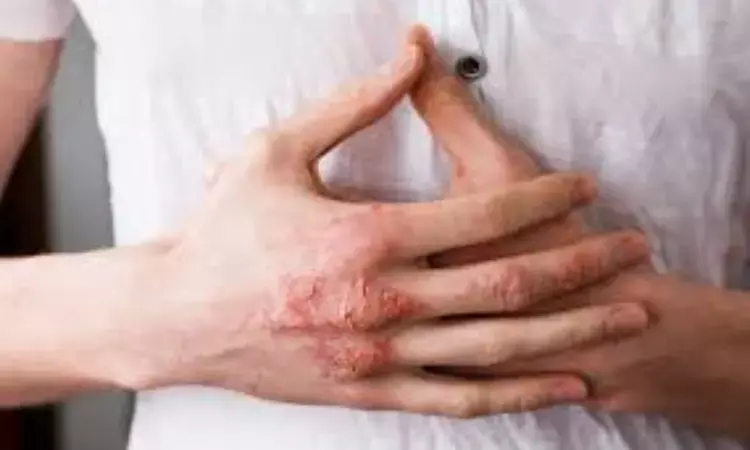- Home
- Medical news & Guidelines
- Anesthesiology
- Cardiology and CTVS
- Critical Care
- Dentistry
- Dermatology
- Diabetes and Endocrinology
- ENT
- Gastroenterology
- Medicine
- Nephrology
- Neurology
- Obstretics-Gynaecology
- Oncology
- Ophthalmology
- Orthopaedics
- Pediatrics-Neonatology
- Psychiatry
- Pulmonology
- Radiology
- Surgery
- Urology
- Laboratory Medicine
- Diet
- Nursing
- Paramedical
- Physiotherapy
- Health news
- Fact Check
- Bone Health Fact Check
- Brain Health Fact Check
- Cancer Related Fact Check
- Child Care Fact Check
- Dental and oral health fact check
- Diabetes and metabolic health fact check
- Diet and Nutrition Fact Check
- Eye and ENT Care Fact Check
- Fitness fact check
- Gut health fact check
- Heart health fact check
- Kidney health fact check
- Medical education fact check
- Men's health fact check
- Respiratory fact check
- Skin and hair care fact check
- Vaccine and Immunization fact check
- Women's health fact check
- AYUSH
- State News
- Andaman and Nicobar Islands
- Andhra Pradesh
- Arunachal Pradesh
- Assam
- Bihar
- Chandigarh
- Chattisgarh
- Dadra and Nagar Haveli
- Daman and Diu
- Delhi
- Goa
- Gujarat
- Haryana
- Himachal Pradesh
- Jammu & Kashmir
- Jharkhand
- Karnataka
- Kerala
- Ladakh
- Lakshadweep
- Madhya Pradesh
- Maharashtra
- Manipur
- Meghalaya
- Mizoram
- Nagaland
- Odisha
- Puducherry
- Punjab
- Rajasthan
- Sikkim
- Tamil Nadu
- Telangana
- Tripura
- Uttar Pradesh
- Uttrakhand
- West Bengal
- Medical Education
- Industry
Corticosteroid Phobia Negatively Impacts Treatment Adherence in Chronic Hand Eczema, reports research

Researchers now report that corticosteroid phobia is indeed a significant concern in patients suffering from chronic hand eczema (CHE), as this phobia severely impacts adherence to topical corticosteroid treatment (TCS). This new finding, which links the fear of corticosteroids with low treatment adherence, further serves to emphasize the need for overtly addressing patient concerns as part of an effective approach to managing CHE. A recent study was published in the Journal of the American Academy of Dermatology by Christensen and colleagues.
The purpose of the study was to assess the patient-reported outcomes of TCS, which would influence treatment adherence in chronic hand eczema. Researchers used the TOPICOP scale, which is a tool for measuring corticosteroid phobia, and the Medication Adherence Report Scale, or MARS, for patients to assess their adherence to prescribed treatments.
The study recruited patients from the Danish Skin Cohort diagnosed with CHE. As a whole, 927 patients responded to a questionnaire which contained the TOPICOP scale and MARS. This helped achieve a response rate of 69.2%. The TOPICOP scale assessed levels of corticosteroid fear, and MARS estimated the degree of medication adherence.
There were high levels of corticosteroid phobia with patients with CHE:
• 75.5 percent agreed that TCS would harm their skin completely or almost.
• 48.9 percent agreed that TCS would affect their health in the future
• 36.3 percent of patients said they felt a level of fear relating to TCS. However, the patients did not know of any risks associated with its use.
The study also gained fruitful understandings on adherence to treatment:
• 77.9% of patients always or often stopped TCS treatment as soon as they could, indicating considerable reluctance to continue the therapy for the duration needed.
• 54.8% reported that they always or often delayed initiating their TCS treatment as long as possible and therefore further delayed appropriate management.
• In summary, 38.8% of patients admitted to receiving fewer doses than prescribed, and 54.0% reported they had stopped their treatment at some point during the course of treatment.
The effects were also of statistical significance on a reduction in the adherence to the treatment with increasing levels of corticosteroid phobia (P = .004), and hence it highlights that fear of TCS directly affects the effective management of CHE.
One of its drawbacks was that use of TOPICOP scale was not validated specifically in patients with CHE. It has been commonly used in other dermatological conditions. The accuracy of capturing corticosteroid phobia for the above-mentioned patient population is dubious.
In conclusion, among patients with CHE, corticosteroid phobia exists, and the adherence to treatment is significantly lower. Educating these patients about fears using tailored communication will be the solution for enhancing adherence and, therefore, proper management of CHE.
Reference:
Christensen, M. O., Sieborg, J., Nymand, L. K., Guttman-Yassky, E., Ezzedine, K., Schlapbach, C., Molin, S., Zhang, J., Zachariae, C., Thomsen, S. F., Thyssen, J. P., & Egeberg, A. (2024). Prevalence and clinical impact of topical corticosteroid phobia among patients with chronic hand eczema—Findings from the Danish Skin Cohort. Journal of the American Academy of Dermatology. https://doi.org/10.1016/j.jaad.2024.07.1503
Dr Riya Dave has completed dentistry from Gujarat University in 2022. She is a dentist and accomplished medical and scientific writer known for her commitment to bridging the gap between clinical expertise and accessible healthcare information. She has been actively involved in writing blogs related to health and wellness.
Dr Kamal Kant Kohli-MBBS, DTCD- a chest specialist with more than 30 years of practice and a flair for writing clinical articles, Dr Kamal Kant Kohli joined Medical Dialogues as a Chief Editor of Medical News. Besides writing articles, as an editor, he proofreads and verifies all the medical content published on Medical Dialogues including those coming from journals, studies,medical conferences,guidelines etc. Email: drkohli@medicaldialogues.in. Contact no. 011-43720751


